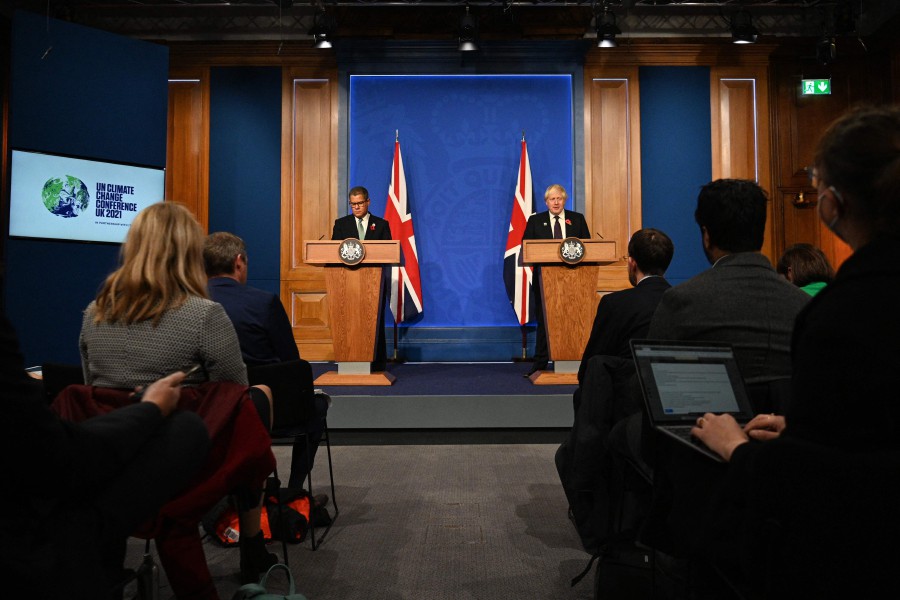"The reason why the climate crisis is not being solved is because it will lead to the biggest shift in power in the history of humanity, it will lead to the biggest transfer of wealth and loss of profit in history."
The above quote is attributed to Joao Camargo's article "COP26: Capitalism's Only Plan for Climate Is Collapse," published by Consortium News.
Worded thus, the climate crisis is a class war. If it is not perceived as such and as the past 25 COPs (international meetings to discuss climate change) stand witness to, since COP1 in Berlin in 1995, climate change is now with us.
The Kyoto protocol was adopted at COP3 in Kyoto, in 1997. Conferences of the parties (COP) have taken place every year in different cities all over the world. Promises were made, but never in earnest.
At the latest COP26 in Glasgow, measures to control carbon dioxide pollution began with conviction only to waver that it finally became a phase down and not a phase out of coal. Huge emission cuts are still needed to limit warming to the 1.5°C. Oil and gas were not mentioned.
If one takes into account that coal makes up 45 per cent of total greenhouse gas emissions then it could be perceived of as some kind of success.
But, again this is better seen as staving off the unavoidable if we are all to be saved from the effects of climate change. The signs are already clear.
The wildfires and the long hot summers, extremely violent storms resulting in severe flooding in Germany and China a few months back are but the beginning of worse things to come if we remain blind to climate change.
And, COP26 has not lived up to expectations. Even as the meeting was happening, oil and gas companies were busy sinking wells the world over to ensure drilling will proceed. So will the emission and pollution.
Much is discussed, corporations and the states wheel and deal and even the best of them are banking on oil and gas stocking up national coffers and employment for the people.
It is as if people are still unable to make the connection between the extreme weather conditions — climate change — and the carbon emission from coal, and oil and gas burning.
Science is telling us the urgency of the problem, but the average human being seems oblivious to the bad air that is poisoning our lungs and the severe storms that are flooding and killing us, too
Yet, there is just not enough of the seven billion of the world's population coming out in protest at the lack of commitment to end global warming.
That it can end and the problem mitigated was demonstrated during the Covid-19 lockdowns. Stories of clean water and air bringing life back to the skies and the rivers. No aeroplanes, no vehicles polluting the air and we breathed better.
But that many were protesting the movement restrictions clearly demonstrated how little it matters to many or the degree of obliviousness extant, to the dangers of climate change.
How many of us are aware of how dangerous the dirty air is to humans? The smog that has become a shared vision of the burgeoning metropolises of Indonesia and India, for instance, and of China until recently, is about the health hazard that is wreaking havoc among the poor, especially.
The rich hide in their homes shutting out the pollution with air conditioners, while the poor breathe the pollution unaware until the damage is done.
Then the promised US$100 billion to assist poorer countries in their mitigation efforts is still not forthcoming although the COP26 has repeated the promise and with luck it will be coughed up ultimately.
This is no charitable assistance. It is payback time. But, will the voices of the rich find expression in actions?
Some three decades and 26 COPs past, much talk and little action. After all, talk is cheap. Capitalism cannot function without profits, the maximisation of which cannot entertain notions of mitigation to save lives.
As the stories of the very rich building bunkers in New Zealand to save themselves from nuclear fallout show, the rich will risk any situation for as long as they can figure out their survival.
But, if Camargo is right and if climate change is to be mitigated, a redistribution of wealth is necessary.
The author is a former NST leader writer



